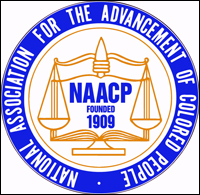The N.A.A.C.P. Still Facing a Battle Over Its Future (+)
by: aappundit
Fri Dec 05, 2008 at 09:02:26 AM EST
[edit diary][promote]
[subject promote]
IP Address: 71.126.191.46
Mfume, who is credited with bringing financial stability and credibility to an organization reeling from scandal and mismanagement when he took over announced his resignation, saying he wanted to spend more time with his family.
at the time, Mfume dismissed persistent rumors among the organization's membership that he was forced out because of a rift between himself and Chairman Julian Bond. Mfume had no role in a nine-member committee that Bond assembled to find his successor.

That was then, this is now.
Now, in 2008, The NAACP Board named a new President and CEO following last year's abrupt resignation of former president Bruce Gordon. The National Association for the Advancement of Colored People has chosen 35-year-old Ben Jealous to lead the organization.

Benjamin T. Jealous, National President-CEO NAACP
Now the word on the street is that the NAACP Chairman, Julian Bond is thinking about not resigning from the Chairmanship of the NAACP. Yes, Julian Bond is reconsidering his plan to step down as
Chairman.
Many are wondering if a bunch of the old guard national board members are asking Julian to reconsider? This writer hopes not. I agree with Julian Bond when he said, "This is a time for renewal. ... The country has a new president in Barack Obama; the organization has a new CEO in Benjamin Jealous, and we'll soon have a new chairman of the NAACP board."
AAPP: I also am well aware of Mr. Bond's great work back in the day, but, Mr. Bonds vision is blurred in many ways, not just by father time, but also due to changes in the black community. It's time for Mr. Julian Bond and other old-timers to step aside and let a new NAACP board and leadership rise. Benjamin T. Jealous needs to be able to address the issues that political analyst Earl Ofari Hutchinson noted sometime ago, when he wrote:
The NAACP can reclaim its cutting edge leadership and activism by mounting a no-holds barred assault on such problems as the glaring iniquities in the imposition of the death penalty, the racially skewed mandatory drug sentencing laws, the HIV/AIDS epidemic, the lack of comprehensive health care for the poor, and grossly underserved, under-performing inner city schools, and chronic double digit black joblessness."
Now I understand that NAACP CEO Benjamin Jealous said in a statement that the civil rights organization looks forward to Bond's continued active involvement. That's all well and good, but if Benjamin T. Jealous is to be successful he needs to be able to address the needs and issues of people that political analyst Earl Ofari Hutchinson said are "trapped in segregated or re-segregated neighborhoods plagued by crime, drugs, and gangs. They shuttle their children off to abominably failing public schools, or are stuffed into bulging jail cells."These are some of the issues the current National NAACP Board and Bond have refused to address for many years.
Read more of the post at: African American Political Pundit.com



No comments:
Post a Comment